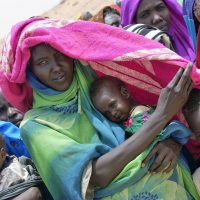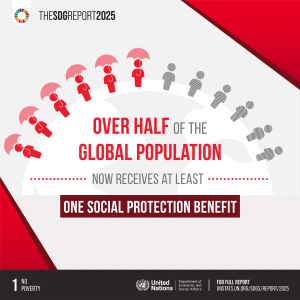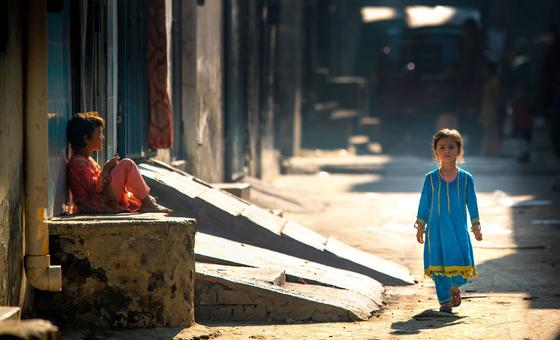Eradicating extreme poverty for all people everywhere by 2030 is a pivotal aim of the Sustainable Development Goals. Extreme poverty, defined as surviving on less than US$3.00 per person per day at 2021 purchasing power parity, has witnessed remarkable declines over recent decades.
However, in 2025, 808 million people – or 1 in 10 people worldwide – were living in extreme poverty, an upward revision from earlier estimates because of the updated poverty line. If current trends continue, 8.9 per cent of the world’s population will still live in extreme poverty by 2030.
A shocking revelation is the resurgence of hunger levels to those last observed in 2005. Equally concerning is the persistent increase in food prices across a larger number of countries compared to the period from 2015 to 2019. This dual challenge of poverty and food security poses a critical global concern.
Why is there so much poverty
Poverty has many dimensions, but its causes include unemployment, social exclusion, and high vulnerability of certain populations to disasters, diseases and other phenomena which prevent them from being productive.
Why should I care about other people’s economic situation?
There are many reasons, but in short, because as human beings, our well- being is linked to each other. Growing inequality is detrimental to economic growth and undermines social cohesion, increasing political and social tensions and, in some circumstances, driving instability and conflicts.
Why is social protection so important?
Strong social protection systems are essential for mitigating the effects and preventing many people from falling into poverty. The COVID-19 pandemic had both immediate and long-term economic consequences for people across the globe – and despite the expansion of social protection during the COVID-19 crisis, 47.6 per cent of the world’s population – about 3.8 billion people – are entirely unprotected, including 1.4 billion children in 2023.
In response to the cost-of-living crisis, 105 countries and territories announced almost 350 social protection measures between February 2022 and February 2023. Yet 80 per cent of these were short-term in nature, and to achieve the Goals, countries will need to implement nationally appropriate universal and sustainable social protection systems for all.
What can I do about it?
Your active engagement in policymaking can make a difference in addressing poverty. It ensures that your rights are promoted and that your voice is heard, that inter-generational knowledge is shared, and that innovation and critical thinking are encouraged at all ages to support transformational change in people’s lives and communities.
Governments can help create an enabling environment to generate pro- productive employment and job opportunities for the poor and the marginalized.
The private sector has a major role to play in determining whether the growth it creates is inclusive and contributes to poverty reduction. It can promote economic opportunities for the poor.
The contribution of science to end poverty has been significant. For example, it has enabled access to safe drinking water, reduced deaths caused by water-borne diseases, and improved hygiene to reduce health risks related to unsafe drinking water and lack of sanitation.

- The updated international poverty line of $3.00 resulted in a revision in the number of people living in extreme poverty from 713 to 838 million in 2022. (World Bank)
- If current trends continue, 8.9 per cent of the world’s population may still be living in extreme poverty by 2030 and only one in five countries will have halved their national poverty levels.
- For the first time on record, over half of the world’s population now receives at least one form of social protection benefit. Despite this milestone, 3.8 billion people remain uncovered.
- The share of government spending on essential services, such as education, health and social protection, is significantly higher in advanced economies than in emerging and developing economies.
- Guaranteeing basic social security floors in low- and middle-income countries requires an additional $1.4 trillion annually, or 3.3 per cent of their aggregate GDP in 2024.
- A surge in action and investment to enhance economic opportunities, improve education and extend social protection to all, particularly the most excluded, is crucial to delivering on the central commitment to end poverty and leave no one behind.
1.1 By 2030, eradicate extreme poverty for all people everywhere, currently measured as people living on less than $2.15 a day
1.2 By 2030, reduce at least by half the proportion of men, women and children of all ages living in poverty in all its dimensions according to national definitions
1.3 Implement nationally appropriate social protection systems and measures for all, including floors, and by 2030 achieve substantial coverage of the poor and the vulnerable
1.4 By 2030, ensure that all men and women, in particular the poor and the vulnerable, have equal rights to economic resources, as well as access to basic services, ownership and control over land and other forms of property, inheritance, natural resources, appropriate new technology and financial services, including microfinance
1.5 By 2030, build the resilience of the poor and those in vulnerable situations and reduce their exposure and vulnerability to climate-related extreme events and other economic, social and environmental shocks and disasters
1.A Ensure significant mobilization of resources from a variety of sources, including through enhanced development cooperation, in order to provide adequate and predictable means for developing countries, in particular least developed countries, to implement programmes and policies to end poverty in all its dimensions
1.B Create sound policy frameworks at the national, regional and international levels, based on pro-poor and gender-sensitive development strategies, to support accelerated investment in poverty eradication actions
Related News
Momentum builds towards marine biodiversity treaty, as experts convene in New York
Delegates from around the world met at UN Headquarters in New York this week to advance the long-awaited high seas biodiversity treaty, with discussions ranging from rules of procedure, to the creation of a clearing-house [...]
Monsoon floods kill more than 700 in Pakistan, with heavy rains set to continue
Heavy monsoon rains and flash floods have killed at least 739 people across Pakistan since late June, displacing thousands and destroying homes and crops, with more severe weather expected in the weeks ahead, according to [...]
It’s time to end physical punishment of kids once and for all, WHO says
Over half of all children under-18 worldwide continue to experience corporal punishment on an annual basis, according to a new report from the World Health Organization (WHO). Read Full Story on UN News
Related Videos
World News in Brief: Funding schools in Afghanistan, Seaweed farming in Latin America, drought in Somalia
The UN World Food Programme (WFP) on Wednesday welcomed a contribution of $3.5 million from the Government of Indonesia to support the agency’s school meal programme in Afghanistan.
Third United Nations Conference on Landlocked Developing Countries (LLDC3) Opens in Awaza, Turkmenistan, Mobilizing Global Partnerships for Inclusive Prosperity
United Nations Deputy Secretary-General Amina Mohammed on Tuesday called on countries to double down on efforts to transform food systems, describing them as “one of the greatest solutions” to achieving the Sustainable Development Goals (SDGs).
The world is demanding action over plastic pollution: UN environment chief
High stakes negotiations got underway at the UN Geneva on Tuesday to agree on a legally binding treaty to curb plastic pollution, attended by delegates from nearly 180 countries. Read Full Story on UN News
Geography shouldn’t define destiny: UN summit on landlocked nations opens in Turkmenistan
Breaking down barriers and restoring fairness in global development should be the goal of the Third UN Conference on Landlocked Developing Countries, Secretary-General António Guterres said at its opening in Awaza, Turkmenistan, on Tuesday.









